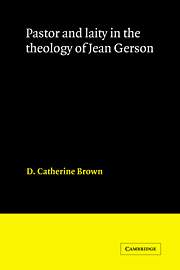Book contents
- Frontmatter
- Contents
- Preface
- List of abbreviations
- INTRODUCTION
- 1 GERSON'S LIFE
- 2 THE ART OF THE PREACHER
- 3 THE ROLE OF THE PASTOR
- 4 THE MEANS OF SALVATION
- 5 THE ANALYSIS OF SIN
- 6 THE MYSTICAL WAY
- 7 WOMEN, MARRIAGE AND CHILDREN
- 8 DOCTOR CHRISTIANISSIMUS ET CONSOLATORIUS
- Notes
- Bibliography of works cited
- Index
3 - THE ROLE OF THE PASTOR
Published online by Cambridge University Press: 20 October 2009
- Frontmatter
- Contents
- Preface
- List of abbreviations
- INTRODUCTION
- 1 GERSON'S LIFE
- 2 THE ART OF THE PREACHER
- 3 THE ROLE OF THE PASTOR
- 4 THE MEANS OF SALVATION
- 5 THE ANALYSIS OF SIN
- 6 THE MYSTICAL WAY
- 7 WOMEN, MARRIAGE AND CHILDREN
- 8 DOCTOR CHRISTIANISSIMUS ET CONSOLATORIUS
- Notes
- Bibliography of works cited
- Index
Summary
THE ECCLESIASTICAL HIERARCHY
The young Luther has recently been described as an anti-clerical tribune standing in the great reforming tradition leading from Gerson through Geiler. Certainly Gerson criticised contemporary clerics, and he criticised them for some of the same vices that Luther did. But Gerson is not anti-clerical in the sense of attacking the power and position of the priesthood. On the contrary, he stands out, even among his contemporaries, as a very vocal and firm upholder of the clerical estate, and in particular of one segment of that estate: the pastors. We have already seen the vital importance which Gerson attaches to preaching in the life of the church. But pastors, that is bishops and parish priests, or major and minor prelates as he usually calls them, had additional tasks, and these tasks together Gerson saw as making the role of the pastor absolutely essential in leading the laity to a life of Christian perfection. For Gerson ‘No salvation outside the church’ might well have been rendered ‘No salvation without the pastor.’ He would have been in full agreement with an anonymous English preacher's remark that without priests ‘there is no help to any Christian man’.
Gerson's general view of the role of the pastor vis-à-vis the laity can be characterised broadly as paternalistic. Certainly his own attitude to the laity, as it comes across in his vernacular sermons and in many of the tracts and sermons he wrote for the instruction of the clergy, bears this characteristic.
- Type
- Chapter
- Information
- Pastor and Laity in the Theology of Jean Gerson , pp. 36 - 78Publisher: Cambridge University PressPrint publication year: 1987
- 1
- Cited by

